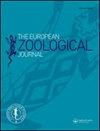Conero Riviera(亚得里亚海西部)岩石潮池中海蛞蝓(异鳃目)的多样性和行为
IF 1.4
4区 生物学
Q2 ZOOLOGY
引用次数: 1
摘要
摘要落基潮池是一种过渡环境,其群落受到突然的温度、盐度和养分波动的影响。此外,这些环境暴露于多种压力源中,很容易被人类践踏而改变。特别是,缺乏对地中海岩石池异枝群落的具体研究。在这项研究中,对生活在亚得里亚海西部(意大利安科纳)人工岩石池系统中的异鳃目(软体动物:腹足目)群落进行了调查,并提供了该城市化地区海蛞蝓的第一份清单。在为期四个月的调查中,共记录了452个标本,隶属于12科19种。值得注意的发现是,在Conero Riviera地区首次记录到树枝状Placida dendrica,在亚得里亚海西部首次记录到Doto cercerenigra和Ercolania viridis。对营养类别的鉴定表明,在食物来源方面存在着多样化的组合,反映了令人惊讶的物种多样性。此外,我们在这里描述了海蛞蝓可能用来应对这个半封闭系统内的压力条件的一种特殊行为。本文章由计算机程序翻译,如有差异,请以英文原文为准。
Diversity and behavior of sea slugs (Heterobranchia) in the rocky tide pools of Conero Riviera (western Adriatic Sea)
Abstract Rocky tide pools are transition environments whose communities are affected by sudden temperature, salinity and nutrient fluctuations. Furthermore, these environments are exposed to multiple stressors and can be easily altered by human trampling. In particular, specific studies on rock pool heterobranchs communities are lacking for the Mediterranean Sea. In this study, the community of Heterobranchia (Mollusca: Gastropoda) living in an anthropized rock pools system in western Adriatic (Ancona, Italy) has been investigated and a first checklist of the sea slugs in this urbanized areas is provided. During the four months survey, a total of 452 specimens, belonging to 19 species and 12 families was recorded. Notable findings were the first record of Placida dendritica for the Conero Riviera, and the first records of Doto cervicenigra and Ercolania viridis for the western Adriatic Sea. Identification of trophic categories showed a diversified assemblage in terms of food sources mirroring a surprising species diversity. Moreover, we provide here the description of a peculiar behavior possibly used by sea slugs to cope with the stressful conditions within this semi-closed system.
求助全文
通过发布文献求助,成功后即可免费获取论文全文。
去求助
来源期刊

European Zoological Journal
Agricultural and Biological Sciences-Animal Science and Zoology
CiteScore
3.10
自引率
5.60%
发文量
80
审稿时长
30 weeks
期刊介绍:
The European Zoological Journal (previously Italian Journal of Zoology) is an open access journal devoted to the study of all aspects of basic, comparative and applied protozoan and animal biology at molecular, cellular, tissue, organ, organismal, population, and community-ecosystem level. Papers covering multiple levels of organization and integrative approaches to study animal form, function, development, ecology, evolution and systematics are welcome. First established in 1930 under the name of Il Bollettino di Zoologia, the journal now has an international focus, reflected through its global editorial board, and wide author and readership.
 求助内容:
求助内容: 应助结果提醒方式:
应助结果提醒方式:


